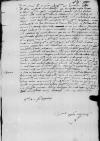List #1905
Ioannes DANTISCUS do Tiedemann GIESEHeilsberg (Lidzbark), 1538-08-16
Regest polski:
Dantyszek cieszy się, że przesłana rocheta jest dobrego rozmiaru; nie wie kto jej poprzednio używał, jednak na pewno nie biskup Maurycy [Ferber], dla którego byłaby za krótka; wysyła krawca z dalmatyką i tuniką w tym samym rozmiarze. Jeśli wydałyby się one Giesemu zbyt staroświeckie, mogą posłużyć jako forma wykroju dla nowych. Ani w biskupstwie warmińskim, ani w chełmińskim nie ma innych szat pontyfikalnych.
Dantyszek relacjonuje Giesemu swoją korespondencję z Aleksandrem [Scultetim] w sprawie odprawienia konkubiny wraz z bękartami. Sculteti napisał do Dantyszka zupełnie co innego niż do Giesego. Przyczynę gniewu Dantyszka upatruje w oskarżeniu, które rzucił na [Stanisława] Hozjusza. Poprosił, by sprawę odłożyć do czasu spotkania, nie zamierza jednak odstąpić od swojego prawa. O ile dojdzie do konfrontacji, Dantyszek zdecydowanie użyje swojej władzy.
O dogodnych czasie i miejscu konsekracji [Giesego] porozmawiają w czasie sejmu grudziądzkiego.
Po opieczętowaniu listu Dantyszek otrzymał nowy list Giesego. Zgadza się z jego radą, aby z powodu zarazy przełożyć jesienny sejm [Prus Królewskich] na wiosnę. Żałuje, że nie był świadom sytuacji dwa dni wcześniej, kiedy wysyłał swojego posła [na dwór]. Prosi Giesego, aby przygotował ich wspólny list w tej sprawie do króla [Zygmunta I] i zebrał pod nim także pieczęcie wojewodów [pruskich]. On sam nie może zająć się tym, ponieważ właśnie wyrusza na objazd diecezji w celu odebrania przysięgi wierności od jej mieszkańców. Obiecuje natomiast zatroszczyć się o ekspedycję listu do króla.
Rękopiśmienne podstawy źródłowe:
Publikacje:
| ||||||
Tekst + aparat krytyczny + komentarz Zwykły tekst Tekst + komentarz Tekst + aparat krytyczny Ekscerpty dotyczące podróży Dantyszka
Reverendissimo Domino
Reverendissime Domine, frater et amice carissime ac honoran(de) or honoran(dissime)⌈honoran(de)honoran(de) or honoran(dissime)⌉.
Salutem et fraterni amoris commendationem.
Quod rocheta iusta longitudine Dominationi Vestrae Reverendissimae respondeat, gratum est. Cuius fuerit, nescio, illam vero reverendissimus olim dominus
Dominus
De die et loco consecrationis in
Dominationi Vestrae Reverendissimae omnia fausta precor illamque diutissime bene valere cupio ex animo.
Dat(ae) or Dat(um)⌈Dat(ae)Dat(ae) or Dat(um)⌉
Reverendissimae Dominationis Vestrae frater integerrimus
Postscript:
Obsignatis iam iis litteris ad Dominationem Vestram Reverendissimam accepi cf.
Opus est igitur, ut ea de re quidam domini
Quod scripsi cum
Quae iterum atque iterum feliciter valeat etc.



 BCz, 245, p. 62
BCz, 245, p. 62